Coordination
Background
Effective coordination can prevent gaps and overlaps in humanitarian responses, ensure the impact of CVA is optimised for the benefit of crisis affected populations, whilst also making the most of limited humanitarian funding. But the CALP Network’s State of the World’s Cash report found that cash coordination is seen as weak and ad hoc, and that this is having serious operational impact.
Ninety-five donors, international and national NGOs, private sector actors and one UN agency have called for clarity on two key issues surrounding cash coordination:
- Who should be accountable for ensuring effective cash coordination, and
- What the scope of Cash Working Groups should be, including in relation to multipurpose cash.
We urgently need to build on what works and provide clarity at the global level on the questions above, whilst adapting to different contexts. Clear decisions based on the impact on affected populations rather than agency politics are long overdue.
Current priorities
We aim to contribute to progress on this issue on three levels: supporting Cash Working Groups at the regional level; contributing to practical solutions for cash coordination at the global level; and convening evidence-based discussion on the key issues, highlighting critical decision points and opportunities for progress.
Featured content

Cash Coordination – LIVE timeline
Page
The latest updates on cash coordination as they unfold.

95 Organisations Sign Letter Calling for Strengthened Cash Coordination
News
Today a letter signed by 95 organisations was handed into the Emergency Relief Coordinator (ERC) urging the Inter-Agency Standing Committee (IASC) to take a decision on the leadership and scope of cash coordination in the coming year.

Is cash transforming the humanitarian system or is the system limiting how cash is used?
Blog Post
At the State of World’s Cash 2020 launch event, Sorcha O’Callaghan, Director of Humanitarian Policy Group at ODI warned that, “Cash offers a huge transformative potential, but as far as the system is privileging the interest of the agencies over people in crisis, we won’t be able to see it”. If you missed the State of the World's Cash 2020 launch we're sharing highlights. Quote 4...
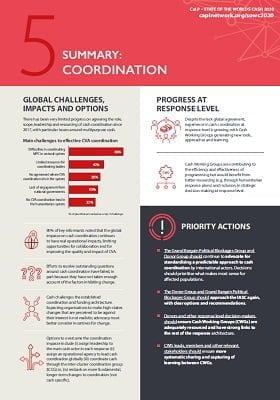
State of the World’s Cash 2020 Chapter 5 summary: Coordination
Report
There has been very limited progress on cash coordination since 2017. Cash continues to challenge the established coordination and funding architecture, and efforts to resolve outstanding questions around cash coordination have failed. Despite the lack of global agreement, Cash Working Groups are pushing forward and contributing to improved programming, and generating new approaches. This...

Cash Coordination Tip Sheet
Guidelines and Tools
This tip sheet sets out established best practice, key guidance and resources for all aspects of cash coordination, intended as a clear, accessible and action-oriented guide for those engaged in coordination of cash and voucher assistance (CVA) at the field level.

Introducing the Cash Coordination Tip Sheet
Webinar
The CALP Network has developed a tipsheet setting out established best practice and key guidance and resources for all aspects of cash coordination, intended as a clear, accessible and action-oriented guide for those engaged in coordination of cash and voucher assistance at the field level.

Cash Coordination: A proposal from members in MENA
Blog Post
Earlier this year the CALP Network undertook regional consultations to explore options for cash coordination. This blog lays out recommendations from participants from the Middle East and North Africa who sketched out what cash coordination, and coordination more broadly, could look like in future to support a more effective, efficient and accountable response.
Thematic lead
Latest

Cash Working Groups: A preliminary mapping
Report
Brief overview of the state of cash working groups in emergency settings.

Cash Transfers in Humanitarian Contexts
Report
Upon request of the Inter-Agency Standing Committee (IASC) Principals at their meeting on December 11, 2015, the World Bank agreed to coordinate a process of reviewing key issues and options for significantly scaling up the use of multipurpose cash transfers (MPCTs; including digital cash and vouchers) in...

Cash-based programming to address hunger in conflict-affected South Sudan: A case study
Report
For some time aid agencies and donors have recognised the benefits of utilising markets to deliver food assistance. And for almost as long, cash-based programming has been effective in doing this by improving people’s ability to purchase sufficient nutritious food. Addressing hunger through cash...

UNHCR Cash Assistance: Improving refugees lives and supporting local economies
Report
UNHCR’s Cash-Based Interventions (CBI) support the most vulnerable Syrian refugees living within the host community in Jordan. Thanks to generous donor support last year, over 30,000 households received monthly cash assistance, winterisation cash, and cash for health, totalling nearly US $ 85 million....

Rapid Assessment for Markets: Bidibidi Refugee Settlement
Report
The Rapid Assessment of Markets (RAM) conducted within the Bidibidi Refugee Settlement and in the surrounding Ugandan towns and trading centres sheds some light upon the rapidly developing network of marketplaces within one of the world’s fastest growing refugee settlements. The RAM highligthed key...

The Politics of Cash: A Case Study on Humanitarian Cash Transfers in Ukraine
Report
This case study examines the evolution of cash transfers in the humanitarian response in Ukraine. The use of cash transfers in Ukraine brought out the best and worst aspects of the international humanitarian system. Uncertainty over where cash fits into the humanitarian architecture – and whether...

Scaling Up Humanitarian Cash Transfers in Nepal
Case Study
The Nepal earthquake has a number of lessons for the global debates on scaling up cash both at the level of cash responses themselves and in the more transformational way envisaged by the High Level Panel through which cash can disrupt the established humanitarian system. Humanitarian cash transfers after...

Scaling up Cash-Based Assistance with ECHO: Common principles for multi-purpose cash-based assistance
Blog Post
In June 2015, the Council of Europe adopted 10 common principles for Multi-Purpose Cash-Based Assistance. While only a small percentage of humanitarian assistance is currently cash-based, the common principles are paving the way for greater advocacy with other donors and partners, as well as in view of...

New the CALP Network Online Training Course: “E-Transfers and operationalizing beneficiary data protection”
Blog Post
With the increase in the use of electronic transfers (e-transfers) in the humanitarian sector, concerns regarding information management of beneficiaries’ data have risen among humanitarian agencies. Although there are principles and operational standards that provide a framework for the protection of...

The role of Cash Working Group Coordinator: Focus on Bangladesh
Blog Post
Multiple country cash working groups have emerged the past years to encourage the coordination of cash transfers across sectors. Eun Jung Yi, Coordinator of the Bangladesh Cash Working Group, presents some of the key achievements of the group within its first 12 months of existence.

New Publication: “MARKit: Price monitoring, analysis and response kit”
Blog Post
The Local Regional Procurement (LRP) Learning Alliance has launched a new publication “MARKit : Price monitoring , analysis and response kit” aimed to guide food assistance practitioners through the steps to monitor markets during the implementation of food assistance programs, and to ensure that...

Protection in Cash Based Interventions – Interviews with Richard Nunn and Lou Lasap
Blog Post
As part of an ECHO-funded Enhanced Response Capacity grant, UNHCR in partnership with WFP, Oxfam GB and the Cash Learning Partnership held an inter-agency workshop on cash and protection in Nairobi on the 10-12th March. The workshop brought together cash and protection practitioners to reflect upon...
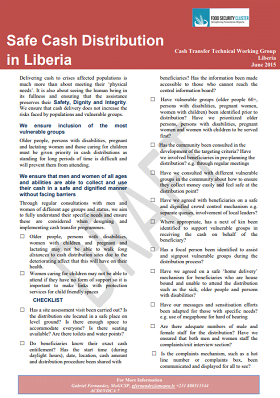
Safe Cash Distribution in Liberia
Report
Delivering cash to crises affected populations is much more than about meeting their ‘physical needs’. It is also about seeing the human being in its fullness and ensuring that the assistance preserves their Safety, Dignity and Integrity. We ensure that cash delivery does not increase the risks faced...
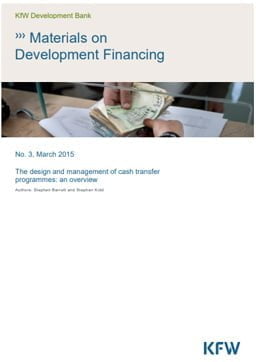
The Design and Management of Cash Transfer Programmes: An Overview
Policy paper
This paper describes and explains the operations of cash transfer schemes, outlining good practice in the design processes required to operationalize policy-level design principles. It describes the four key components comprising the administrative structure of most cash transfer programmes and, based on...
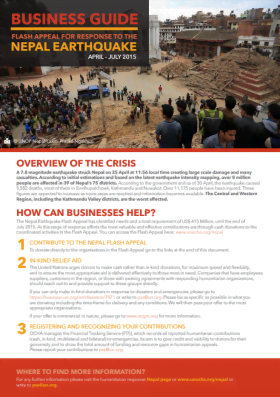
Business Guide – Flash appeal for response to the Nepal earthquake
Policy paper
An overview of the main humanitarian issues facing Nepal following the 2015 Earthquake, as well as indicators as to how businesses can assist with disaster response.

Liberia Ebola Response
Presentation
ICRCs EVD Cash response program had to be designed under a rare circumstance of insufficient baseline data on EVD impact on household level and limited opportunity to contact intended beneficiaries for a detailed assessment/ proper situational analysis.
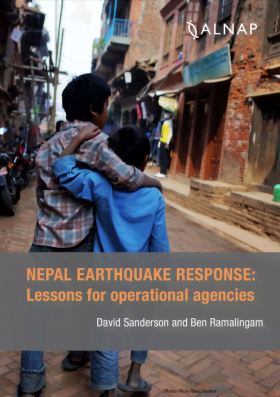
Nepal Earthquake Response: Lessons for operational agencies
Policy paper
In the aftermath of the April 2015 earthquake in Nepal, this paper looks at lessons drawn from previous comparable disasters and seeks to provide invaluable information and assistance to the operational agencies responding to the crisis. Seventeen Lessons give an overview of important learnings based on...
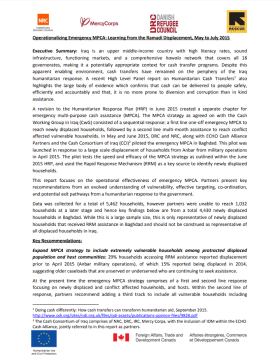
Operationalizing Emergency MPCA: Learning from the Ramadi displacement, May to July 2015
Report
Iraq is an upper middle-income country with high literacy rates, sound infrastructure, functioning markets, and a comprehensive hawala network that covers all 18 governorates, making it a potentially appropriate context for cash transfer programs. Despite this apparent enabling environment, cash transfers...

Markets in Crises: South Sudan case study
Report
Not long after achieving independence, South Sudan descended into conflict, which has fuelled displacement and food insecurity.Although markets continue to function in the country, humanitarians have paid relatively little attention to market-based responses to the crisis. Looking primarily at Juba, this...
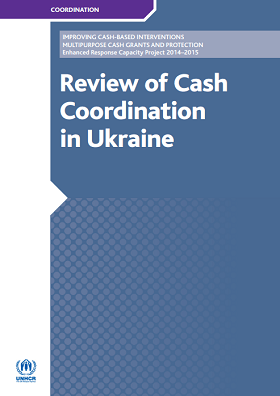
Review of Cash Coordination in Ukraine
Report
Ukraine is a lower middle-income country in Eastern Europe, with a strong soviet era legacy in the field of social protection. Since early 2014, Ukraine has been affected by conflict in its eastern part, which led to the internal displacement of more than 1.4 million people. At the time this paper was
